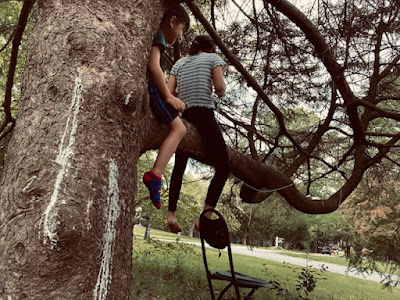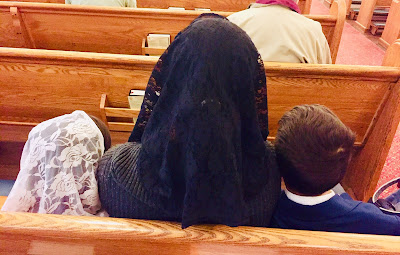A year or so ago my 7 year old son fell from a not-insignificant height. It was the kind of fall on the playground where all the kids (and adults) turn and hold their breath, when time stands still for a few split seconds.
I was driving home from work when my wife called me. She was on her way to the hospital with our son, who seemed physically okay and not in pain, but who kept repeating the same questions over and over.
Not knowing the full extent of the fall apart from the few brief words my wife shared over the phone, and fearing a brain injury, I hung up, and opened up my mental rolodex of holy men and women I hold “on retainer” when I need them most.
Though I have my more established and well-known entourage of saints who have intercede for us in powerful ways--St. Catherine Laboure, St. Pio of Pietrelcina, St. Jude, to name a new--I have a special place in my life for those holy men and women who have not yet been formally canonized. My hope is that one day, in our time of need, they will work a needed miracle for us and in turn give witness to the mighty power of God
There is Servant of God Fr. Walter Ciszek, whose grainy portrait from a Siberian gulag hangs in our kitchen with the hard-scrabble caption underneath: “Give God your lousy best.”
There is Servant of God Fr. John Hardon, whose archives of talks and writings I have bookmarked when I need courage and clarity in the midst of my personal (and feeble) “white martyrdoms;”
And there is Servant of God Frank Parater, a seminarian from the diocese of Richmond, Virginia who died at the age of 22 in Rome of rheumatic fever and who offered his death for the conversion of non-Catholics in Virginia. His “death wish” was an inspiration to me that nothing be wasted, not even our retirement from this earthly life.
As my mind flipped through these holy figures and more, by the inspiration of the Holy Spirit, one man came to mind whose story I had heard about somewhere. His name was Francis Houle.
Irving “Francis” Houle was a father of five and grandfather of seven who lived in Michigan, was a fourth-degree Knight of Columbus...and received the stigmata in 1993 at the age of 67. I remembered reading about him, and that he had fallen from a horse as a child and suffered near fatal injuries but was healed when an army of nuns prayed for him.
Whenever I rely on “friends in high places” for help, I try to call upon those who I feel would understand or have a special affinity for our particular situation based on their life or charism. In this case, I felt Francis Houle, the stigmatist from Michigan who lived in my lifetime, would understand and help my son. The who drive, I kept saying over and over, simply, “Francis, help!”
When I arrived at the hospital, my son was still confused and stuck in a ‘loop’ of questioning where he was and how he had gotten there. My greatest fear was short or long-term memory loss, as I had never dealt with head injuries before. The doctor who evaluated him, thankfully, determined he was suffering from a concussion but noted that he was very lucky in that he hit a hard part of his skull; if he would have fallen at just a slightly different angle, the potential for lasting damage would have been much more probable.
My son’s memory returned over the next few days, and his concussion subsided. Though this probably would not have counted as a miracle in the formal sense, I felt indebted to someone I at least knew understood and no doubt worked in some way to come to our aid, this married father, grandfather, and great grandfather from Michigan who bore the wounds of Christ and healed countless people who he prayed over. He was humble and unassuming. After all, he had children himself.
Not long after that event, we ended up having Thanksgiving dinner at a family member’s house where one of Francis Houle’s sons joined us as a guest. We recounted the incident to him, and he shared stories of all the people who would come to see his father. Though we didn’t discuss personal faith, I got the impression it was overwhelming at times for him and his mother, Francis’ wife. He recounted one particular instance in which his father was getting sick in the bathroom, and it was only realized later that he had, in praying over a cancer patient, taken on the poisonous effects of the chemotherapy himself.
As a husband and father of three, it is my greatest hope that I will see the glory of Heaven one day, and that my wife and family will join me there. It is what I live for, and what I hope to die for, God willing.
But when I thumb through that old mental rolodex of those on the roster in the Church Triumphant, I often wish there were more models I can relate to and emulate in my state of life--that is, as a husband and father. Sure, there are married canonized saints throughout history, some together (like Louis and Zelle Martin, parents of St. Therese of Lisieux), and some canonized separately. But for the most part, those canonized are primarily religious.
There are probably a multiplicity of reasons for this beyond the scope of this article, both religious and political. Not for a second do I doubt my calling to be a husband and father, nor do I question whether this is what God has chosen for me as my path to sanctification, which I am responsible for carrying out. But when I look around, can those “friends in high places” relate to this state when they themselves have chosen “the better part,” a higher calling, a renunciation of marriage and family for the sake of the Kingdom?
How does one live out the sacrament of marriage--not just to be healthy and happy, in love and old age, but for the purpose of attaining sainthood, for oneself and for one’s spouse? What does it look like? How do we exercise patience, chastity, temperance, when the floor is strewn with Legos, we’re tired from work and childrearing, and we lose our temper so easily?
I was always taught that the saints exercised heroic virtue. What is heroic about raising a family? Working a job? Taking vacations? Going to Mass on Sundays and praying the rosary in the evening? What worthiness is there for others to emulate, were we to be canonized some day? “Oh look, she did the dishes in love,” or “he worked hard to provide.” Yes, I know there is sanctification in the ordinary, humdrumness of life when done with love. But it is that very ordinariness, that part that is not, in fact, ‘set apart,’ that makes me wonder if this is, in fact, why there seem to be so few married canonized saints.
Of course, marriage and family life is a daily “dying to self” when done for Christ’s sake, because he set the example for us to follow in washing his disciple’s feet and offering his life to save theirs. It may in fact be harder to achieve the same level of sanctity as a religious given the unique burdens of our state in life. It does not make us exempt from the universal call to holiness. It just means we need to adapt our circumstances to make it our sole focus, while still maintaining and setting to the responsibilities of our state.
The ‘hidden life’ inside the walls of the domestic church is largely just that--hidden. And for good reason. Individual families--though they may be holy and worthy of emulation--do their duties quietly. People may hear about them ‘through the grapevine’ and want to be near them for their ordinary sanctity and warm charity. But they may not have a diocese or a large public gathering lobbying for a husband or wife’s cause to be considered, though they may already be wearing the crown of righteousness in Heaven, official title or not.
The process of canonization is careful and methodical for good reason, and it is also for the benefit of us, the Church Militant because we are the ones who need the saints, not the other way around. Though I do worry if I ever, by some miracle, achieve such a state and have church officials combing through my emails and text messages and interviewing my friends and family what they will find out about me.
We know from St. Paul’s words to the church in Corinth that the married man is divided and not free from concern as is the unmarried man (1 Cor 7:32, 34). Can a married man be saved? Can he wear the crown of righteousness? We know if can be done, for nothing is impossible with God.
“If ye be perfect,” says the Lord. But we are not perfect, and any perfect person in marriage or parenthood is, for all intents and purposes, probably not of the human species. And yet, the call is there. We are called to be perfect, as our Heavenly Father is perfect. But it is not by being a St. Francis or a St. Catherine of Siena or even a Francis Houle. It is by being YOU. God made you like no other, and if you are married and a father or mother, he destined you to live out your life as such.
You may not be doing hard time in a Siberian labor camp but if you are loving and forgiving your spouse when everything in you screams to lord their faults over them, and there is no one around to see you do it, you are not only living the beatitudes, dying to self, and doing so in secret...you are fulfilling the Greatest Commandments.
When you give your wife the bigger pork chop because it’s the one you want, and you do it day after day, meal and after meal, decade after decade, until your last supper on earth...are you not acting in the same way as a wise virgin trimming her lamp and holding her oil for the day the bridegroom comes?
When you live the virtues for your children to see, and set a hedge of protection around your hearth and home to keep out the things that harm--are you not setting yourself as a human shield, weaving a fence of thorns which you wrap and mend with your own bloodied hands to protect those little lambs whom Christ himself died for? Is your fatherhood, though temporal, not spiritual in the legacy it builds brick by brick, virtue by virtue, sacrifice by little sacrifice?
Whether or not we are formally recognized on earth among men for our sanctity matters very little when you have run the race and are wearing the crown. Our crosses are custom built for our backs, and the weight of all the family affairs we bear as well make it a unique burden and an unlikely joy as well. We are made whole through sacrifice, through suffering, through the school of charity which is the domestic church in which we learn the hard way how to love, how to forgive, and how to hope. There is no use wishing you were a priest or a nun. You have all you need for your journey. God has made you a mother, a father, a spouse. He has made you, YOU. He has to start somewhere today. He may as well start with you.











